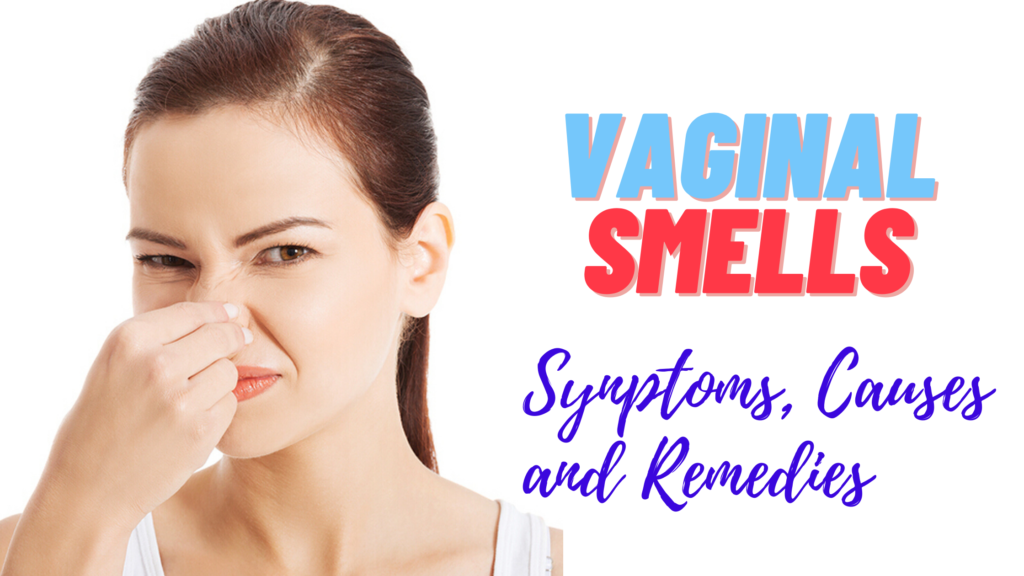Understanding Vaginal Smells
As a woman, you may have experienced vaginal smells at some point in your life. It can be embarrassing and uncomfortable, but it is a common issue that many women face.
Vaginal smells can be caused by a variety of factors and can be an indicator of an underlying health condition. In this blog post, we will discuss the causes, symptoms, remedies, and treatment options for vaginal smells.
Causes of Vaginal Smells
There are many factors that can cause vaginal smells. Some of the common causes are:
- Bacterial vaginosis (BV)
BV is the most common cause of vaginal odor. It occurs when there is an overgrowth of bacteria in the vagina. The odor associated with BV is often described as a fishy smell.

- Yeast Infections
Yeast infections can also cause vaginal smells. Yeast infections are caused by an overgrowth of yeast in the vagina. The odor associated with yeast infections is often described as a sour smell.
- Sexually Transmitted Infections (STIs)
Certain STIs, such as trichomoniasis, gonorrhea, and chlamydia, can cause vaginal smells. These infections can cause an unpleasant odor, as well as other symptoms such as itching, burning, and discharge.
- Poor Hygiene
Poor hygiene can also cause vaginal smells. When sweat and bacteria build up in the vaginal area, it can cause an unpleasant odor.
- Menopause
During menopause, the decrease in estrogen levels can cause a change in the vaginal pH, leading to vaginal smells.
Symptoms of Vaginal Smells
The most common symptom of vaginal smells is an unpleasant odor. The odor can be described as fishy, sour, sweet, or musty. Other symptoms may include:
- Itching and irritation in the vaginal area
- Burning during urination
- Discharge from the vagina
- Pain during sex
Remedies for Vaginal Smells
There are many remedies that can help to reduce vaginal smells. Here are some of the most effective remedies:
- Practice good hygiene
Practicing good hygiene is one of the most effective ways to reduce vaginal smells. You should wash the vaginal area with warm water and mild soap. Avoid using scented products and douching.
- Wear cotton underwear
Cotton underwear is breathable and can help to reduce sweating in the vaginal area, which can cause vaginal smells.
- Avoid tight-fitting clothing
Tight-fitting clothing can trap moisture in the vaginal area, which can lead to an overgrowth of bacteria and vaginal smells.
Related : How To Manage Menopause And Diabetes At Home
- Use probiotics
Probiotics can help to restore the balance of bacteria in the vagina, which can help to reduce vaginal smells. You can take probiotics in supplement form or eat foods that are rich in probiotics, such as yogurt.
- Use essential oils
Essential oils, such as tea tree oil and lavender oil, have natural antibacterial properties that can help to reduce vaginal smells.
You can add a few drops of essential oil to a warm bath or dilute it in a carrier oil and apply it to the vaginal area.
Treatment Options for Vaginal Smells
If home remedies are not effective in reducing vaginal smells, it may be necessary to seek medical treatment. Here are some of the most common treatment options for vaginal smells:
- Antibiotics
Antibiotics are often prescribed to treat bacterial vaginosis and other bacterial infections that cause vaginal smells.
- Antifungal medication
Antifungal medication is often prescribed to treat yeast infections that cause vaginal smells.
- STI treatment
If the vaginal smell is caused by a sexually transmitted infection, specialized treatment is required. Your healthcare provider will prescribe medication to treat the specific infection.
- Hormone therapy
If the vaginal smell is caused by menopause, hormone therapy may be prescribed to restore the balance of hormones in the body.
- Surgery
In rare cases, surgery may be required to remove a foreign object that is causing vaginal smells.
When to See a Healthcare Provider
If you are experiencing vaginal smells that are accompanied by itching, burning, discharge, or pain during sex, it is important to see a healthcare provider.
These symptoms may be an indication of an underlying health condition that requires medical treatment.
Additionally, if you have tried home remedies to reduce vaginal smells and they are not effective, you should see a healthcare provider.
They can help to determine the underlying cause of the vaginal smells and prescribe appropriate treatment.
In conclusion, vaginal smells are a common issue that many women face. They can be caused by a variety of factors, including bacterial vaginosis, yeast infections, sexually transmitted infections, poor hygiene, and menopause.
Practicing good hygiene, wearing cotton underwear, avoiding tight-fitting clothing, using probiotics, and using essential oils can help to reduce vaginal smells.
If home remedies are not effective, medical treatment may be necessary. Your healthcare provider may prescribe antibiotics, antifungal medication, hormone therapy, STI treatment, or surgery, depending on the underlying cause of the vaginal smell.
Remember, it is important to see a healthcare provider if you are experiencing vaginal smells that are accompanied by other symptoms or if home remedies are not effective.
Your healthcare provider can help to determine the underlying cause of the vaginal smell and prescribe appropriate treatment.
